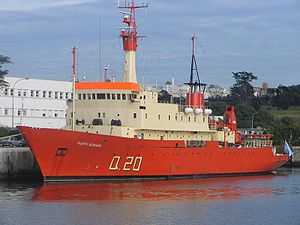ARA Puerto Deseado (Q-20)
 ARA Puerto Deseado in Mar del Plata | |
| Career (Argentina) | |
|---|---|
| Name: | Puerto Deseado |
| Namesake: | Puerto Deseado |
| Ordered: | 7 December 1971 |
| Builder: | Astarsa |
| Launched: | 8 December 1976 |
| Commissioned: | 11 December 1978 |
| Fate: | in service as of 2010 |
| General characteristics | |
| Displacement: | 2400 tons (full) |
| Length: | 76.8 m (252 ft) |
| Beam: | 15.8 m (52 ft) |
| Draft: | 3.5 m (11 ft) |
| Propulsion: | 2 Diesel-electric 900 KW each |
| Speed: | 14 knots (26 km/h) |
| Range: | 12,000 mi (19,000 km) at 12 knots (22 km/h), 90 days |
| Complement: | 60 + 20 scientist |
| Sensors and processing systems: | navigation radar Decca 1629 |
The ARA Puerto Deseado (Q-20) is an oceanographic survey ship in service in the Argentine Navy. She has a reinforced hull in order to operate in waters around Antarctica.
History
Puerto Deseado was built by Astilleros Argentinos Río de la Plata (Astarsa) shipyard in Tigre, Buenos Aires and commissioned into the Argentine Navy in 1978. She was the first navy ship to be named upon the city of Puerto Deseado in the patagonian Santa Cruz province.
During the 1982 Falklands War she served as hospital ship.
On 2003 she participated on the unsuccessful attempt to find the sunken cruiser ARA General Belgrano along with a National Geographic team on the vessel Seacor Lenga .[1][2]
Puerto Deseado serves the CONICET, the Argentine government agency that directs and co-ordinates scientific and technical research. The ship actively participated on the summer Antarctic campaigns.[3] Her scientific equipment includes a gravimetric sensor, magnetometers, seismic systems, high frequency sound sonar and a geological laboratory.
On 2007, Puerto Deseado and Comodoro Rivadavia, were reequipped by Kongsberg Gruppen with bathymetric systems in a program sponsored by the UNDP (United Nations Development Programs).[4] Since then, Puerto Deseado was involved in the investigation of the continental shelf of the Argentine Sea that was finally submitted on 22 April 2009 to the United Nations (UN) for 1,700,000 square kilometres (660,000 sq mi) of ocean territory to be recognised as Argentina's as governed by the Convention on the Continental Shelf and Convention on the Law of the Sea.[5][6][7]
On March 2010 she began studies on behalf of Repsol YPF.[8]
She is home based at Mar del Plata.
References
- Official site
- ARA Puerto Deseado at Irizar.org
- ↑ Llegó a puerto el Seacor Lenga
- ↑ No hallaron al ARA General Belgrano
- ↑ El buque oceanográfico “Puerto Deseado” zarpó hacia la Antártida
- ↑ KONGSBERG installs echo sounders on Argentine Navy survey ships
- ↑ "Argentina claims vast ocean area". BBC News. 22 April 2009. Retrieved 22 April 2009.
- ↑ El buque Oceanográfico ARA” Puerto Deseado”, inicia la CAV 08-09
- ↑ El Senado bonaerense resalta el aporte del buque oceanográfico “Puerto Deseado”
- ↑ elabora estudios en el marco de un convenio entre YPF y el CONICET en procura de realizar una utilización de los recursos del lecho marino
External links
| |||||||||||||||||||||||||||||||||||||||||
